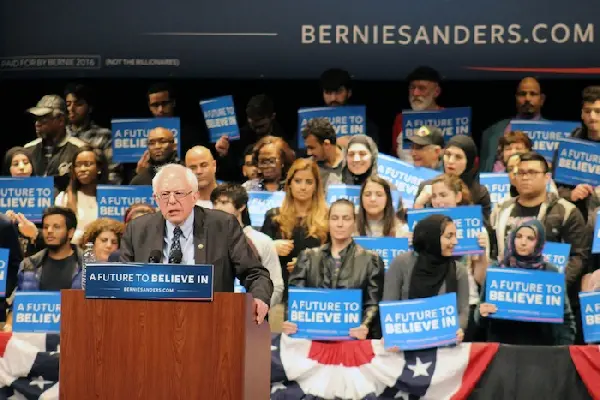
|
| Sanders, speaking at Dearborn’s Civic Center, March 7 |
DEARBORN — Decisively backing Bernie Sanders in the Michigan Democratic primary is perhaps Arab America’s greatest electoral victory on the national stage.
But to the dismay to thousands of Arab American supporters, the senator from Vermont will not be the next president.
The California primary effectively brought to Hillary Clinton the number of delegates needed to win the nomination, Sanders endorsed her on Monday, ruling out the possibility of running on an independent ticket or heading to a contested convention.
In the height of the primaries, there was a notable movement dubbed “Bernie or Bust” within the ranks of Sanders’ supporters. The rationale was that if Sanders were not to be the Democratic nominee, his backers would not vote for Clinton.
As the campaign concludes, party unity is becoming a major theme on the Democratic side, especially since the presumed Republican candidate is an extraordinarily loathed figure by Democrats.
As a matter of fact, in a video message to his supporters, Sanders said last month that defeating Donald Trump is a political priority for him.
Beyond party politics, Arabs favored Sanders for a reason. His fresh anti-establishment rhetoric, repeated condemnation of Islamophobia, dovish foreign policy and even-handed approach to the Israeli-Palestinian conflict.
In the meantime, Clinton has had interventionist inclinations both as a senator and as secretary of state. She voted for the war on Iraq, favored military intervention in Syria and led regime-change efforts in Libya. Not to mention, she unequivocally backs Israel. She spoke at AIPAC without uttering a word about occupation or the plight of Palestinians.
But faced with the possibility of a Trump presidency, many Arab Americans may favor her as the lesser of two evils. (We are discounting partisan Arab Americans who would vote for their respective party’s nominee regardless of who he or she is).
Recent elections have proved that at least Dearborn Arabs overwhelmingly favor Democrats. For example, they voted for Senator Gary Peters by more than 90 percent in 2014.
“Vote your conscience”
Palestinian American comedian Amer Zahr, who was a surrogate for Sanders, will not be voting for Clinton.
He said the Arab American community’s support for the democratic socialist senator was inspiring.
Sanders’ campaign gained concessions and pushed progressive policies into the Democratic Party’s platform, including adopting a $15 an hour federal minimum wage and putting greater emphasis on renewable energy.
“However, for the issues that we supported him for… the Democratic National Committee did not change on these issues; in fact, they got worse,” Zahr said.
The comedian was referring to Democrats’ failure to recognize the illegal Israeli occupation in the West Bank or talk about the human suffering in Gaza.
Although Sanders chose James Zogby and Cornel West as delegates to the platform committee, Clinton’s supporters outvoted them on the Israeli-Palestinian subject.
“It means we cannot support the Democratic Party now if we are to have any consistency or morality in our position,” Zahr said. “We gained a lot of political capital by supporting Bernie Sanders. We won him Michigan. We kept him in the race. We can’t throw away those historic things that we did by simply falling behind Clinton.”
Zahr rejects the notion that not voting for Clinton is the equivalent of voting for Trump.
“Donald Trump is a crazy, racist, xenophobic person,” he said. “Hillary Clinton is militaristic, hawkish. She has a long resume of disrespecting our community whether here or abroad. Which is worse? I think they’re both pretty bad.”
He added that Arab Americans backed Sanders because his campaign was protest movement against the establishment.
“We can’t just now turn around and support Hillary Clinton, even at the prospect of Trump,” he said. “There are other alternatives. It doesn’t mean they’re going to win, but if we’re ever going to change the system, we need to vote for them. We need to vote our conscience.”
He added that voting should be based on the best option, not who is less unfavorable of the two major party candidates.
Last week, a Reuters poll revealed a growing appeal for third party candidates because of Clinton’s and Trump’s unfavorability.
Unhappily with her
Zahr’s approach is not the only one. Some Arab Americans who were “feelin’ the Bern’ will reluctantly vote for Clinton as the anti-Trump option.
Saba Shoubah, a 26-year-old Dearborn resident, said she will vote for Clinton despite her reservations about the former secretary of state’s character.
She said she dislikes Clinton’s policies, especially her stand on the conflict in Palestine, but added that the presumptive Democratic nominee has redeeming qualities.
Shoubah said Clinton will want to preserve her family’s political legacy, while Trump has no loyalties to anything or anyone except himself.
“I would vote for Hillary just to keep him out of office,” she said. “Also Bernie just endorsed her. He has a reason why he’s backing her. He knows that Donald Trump would be detrimental to our country.”
Ilfat Maatouk, 25, a Dearborn engineer, said she expected Sanders to back Clinton. But she saluted the senator’s campaign, saying his challenge pushed the former secretary of state to adopt more progressive positions to win over liberal voters.
She said she would unhappily vote for Clinton to prevent Trump from getting to the White House.
Maatouk added that the “Bernie or Bust” mentality is one-sided.
“It’s very black and white and things are not really like this in real life,” she said. “What are they going to do? Vote for Trump? I don’t think that’s a good option.”
The engineer added that third party candidates like Jill Stein (the Green Party’s presumptive nominee) will take liberal votes, while the conservative base remains united behind Trump.
“It’s almost as if you’re voting for Trump,” Maatouk said of backing Stein. “I’m putting more focus on how I want our country to be. We can’t just focus on our need to make a statement. If all Bernie supporters make that statement, it will end with Trump being president. Are you willing to risk that?”
She said the lesser-of-two-evils approach, voting against the opposing party’s candidate, has always been a driving force in U.S. elections.
“And it’s sad,” she said. “It’s not democratic. It’s not optimal. It’s very difficult when you are voting against people and voting against policies, instead of voting for things. But I feel like I have no other choice, right now.”
Mohamed Badaou, a business owner, said he would ideally be with the “Bernie or Bust” movement, but he will likely vote for Clinton.
“Ultimately, I believe it’s best to choose the Democrats because we value progressive ideas versus repressive Republican policies.”






Leave a Reply